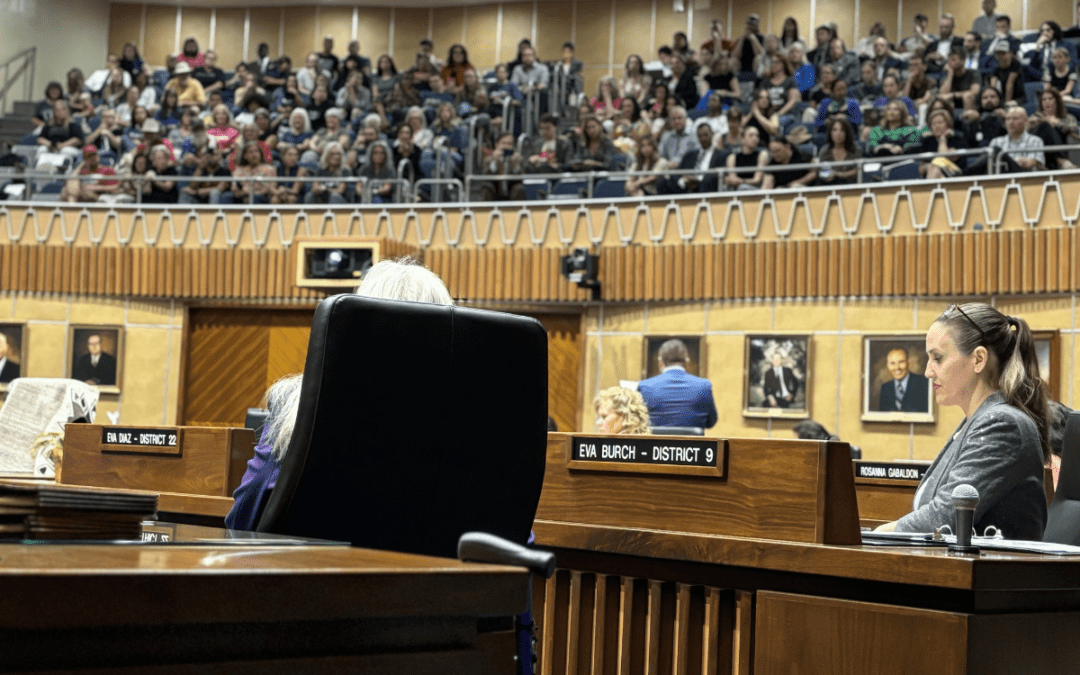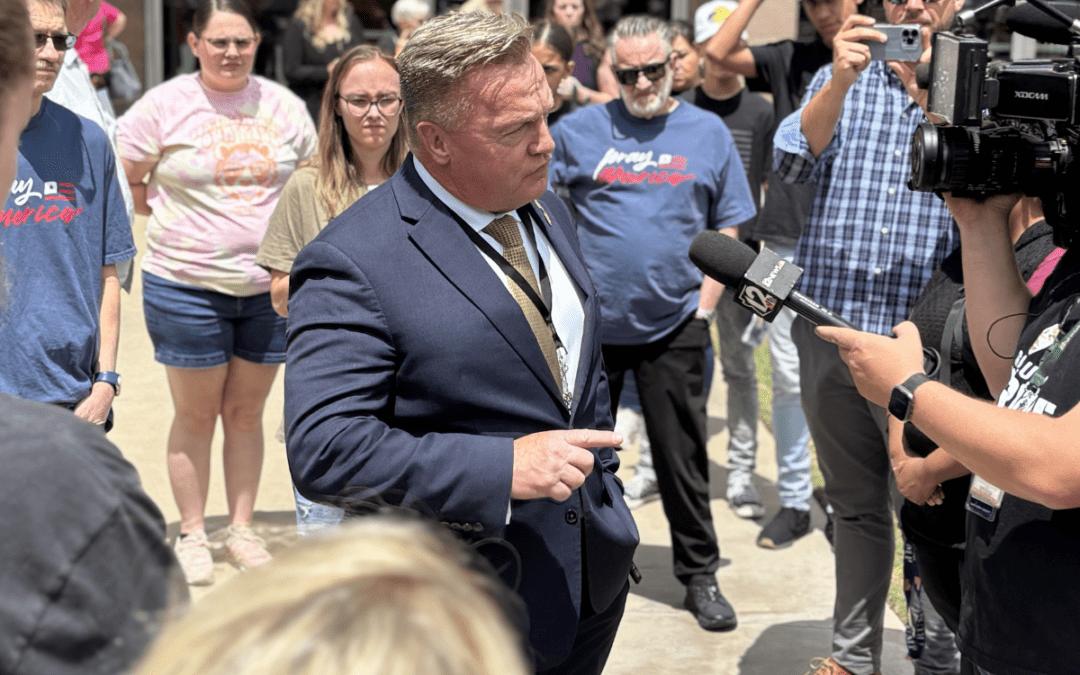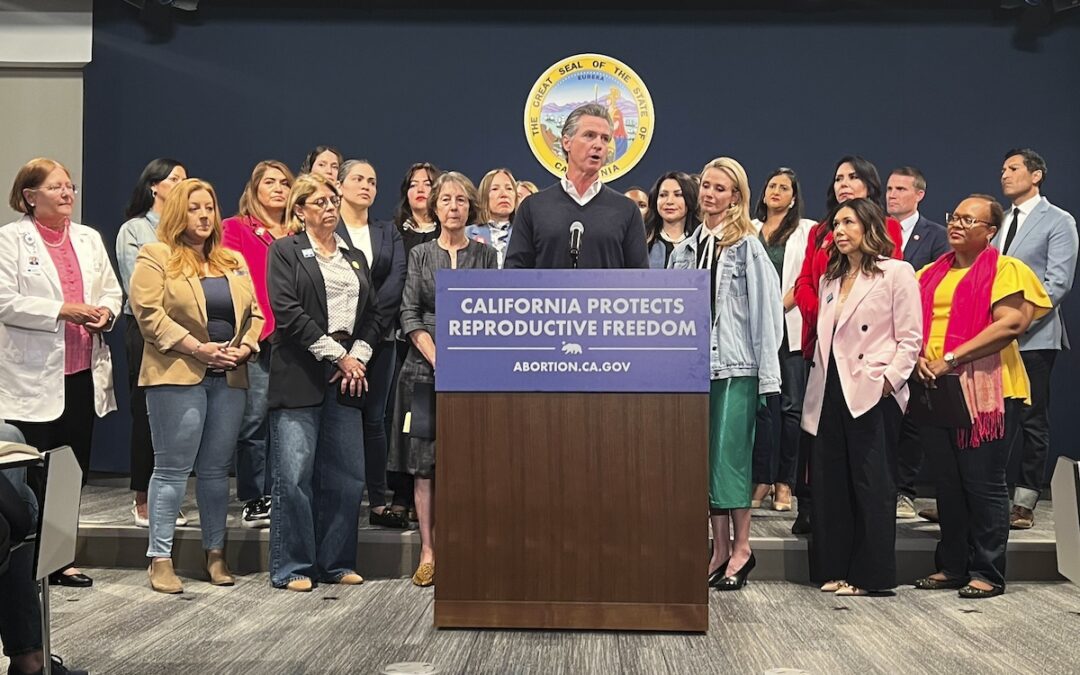
John Moore/Getty Images
The county’s usual “failure to appear” rate for tenants in eviction cases is around 36%. However, the average for this year is only about 25%.
When the pandemic began early this year, Maricopa County and other court systems moved to remote procedures to keep everyone safe.
For eviction hearings, tenants, landlords, attorneys, and justices of the peace came together in a conference call.
Normally, these parties would all gather in the courthouse and wait for their case to be called, sometimes making it a day-long process.
But now with the remote proceedings in place, more tenants are attending.
According to Maricopa County Justice Courts spokesperson Scott Davis, the usual “failure to appear” rate for tenants in eviction cases is around 36%.
However, the average for this year dropped to 25%. In the fall, the numbers dipped even lower with only about 10% missed their court date in November.
“Of course, more people attending means proceedings take longer than we are used to,” Davis wrote in an email to The Copper Courier, “but that is a small price to pay when more citizens can feel included in the process.”
A Sometimes Helpful Option
Eric Dunn, litigation director for the National Housing Law Project, said the inability to take off work for a full day in court prevents many from attending. Remote hearings can ease that burden.
Tenants attending remotely may not have to take time off, find childcare, find transportation, or deal with other barriers of attending in person.
But while calling into a hearing from home may make things easier for some tenants, it’s not necessarily the best option for everyone in a post-pandemic world when in-person hearings may be available again.
Challenges include finding ways to call in and submit documents online—for people without reliable devices and internet access, it can be easier to just talk in person and hand papers to a judge.
“I think it’s a good idea to keep the option for people that want to take advantage of it,” Dunn said, “but I don’t think it should be compulsory.”
Matthew Waterman, managing attorney of Southern Arizona Legal Aid’s Consumer, Housing, Public Benefits unit, said that the time constraint is a big barrier for many tenants.
“For a lot of the clients, they’ve got four or five days to scramble to find a way to call in,” Waterman told The Copper Courier.
“It’s certainly something which has potential benefit if it can be worked out in a way which is actually fair to both sides,” he added. “Because right now it seems like it’s very, very fair to the landlords. It saves them a lot of time and energy. Not so fair to the tenants, because they don’t have enough time to do anything.”
Officials Say Appearance is Important
But no matter which way it’s done, Dunn said tenants appearing at their hearing is “critical.”
“I think it’s questionable whether courts should still be hearing eviction cases right now at all,” he said, “but if you’re a tenant and you have an eviction hearing scheduled then nothing good can happen if you’re just not going.”
Tenants can tell their side of the story in a hearing and note possible defenses, including federal protection related to the pandemic. They can also tell the judge if there are any issues with the judgment balance, like if a landlord included a month’s rent that has already been paid.
“The benefit usually is if you’ve had the time and the access to the information, it’s very beneficial if you can go there and contest the numbers,” Waterman said.
Tenants can also potentially negotiate a payment plan with a landlord. This can be done before a hearing, but Dunn said it often doesn’t happen until all parties are gathered together.
“If the tenant doesn’t show up, then all of those decisions are going to be made with no input from the tenant,” Dunn said. “And the tenant may not even know what those decisions are.”
Pressing Issue Posed to Only Get Worse
Evictions proceedings are more important than ever as hundreds of thousands of Arizonans are at risk of losing their homes.
According to The Aspen Institute, up to 771,000 Arizonans are at risk of eviction.
The US Centers for Disease Control and Prevention’s pause on evictions for certain tenants affected by COVID was originally slated to end Dec. 31.
If President Donald Trump signs the new relief bill that Congress passed Monday, that deadline will be extended to the end of January.
The bill would also approve $25 billion to go toward rental aid, with up to 15 months of assistance available per household.
However, Trump has pushed back on the bill for other reasons, including the amount of stimulus offered to Americans, making its future unclear.
Politics

Democrats successfully force vote on repealing 1864 abortion ban, passes House
The Arizona legislature moved forward two bills Wednesday that would repeal the state’s 1864 abortion ban. A bill to repeal the ban has been...

State Official: 1864 abortion ban gives Arizona ‘black eye’
Arizona’s role at the forefront of the climate crisis, defending democratic elections, and protecting reproductive rights has caught the attention...
Local News

Arizona Sens. Anthony Kern, Jake Hoffman, indicted for fake election scheme
Eighteen individuals involved in a conspiracy to overturn Arizona’s election results in 2020 were indicted by a grand jury Wednesday and charged...

Gov. Gavin Newsom wants to let Arizona doctors provide abortions in California
California law generally allows abortion up to the point of fetal viability, which is around 24 weeks. SACRAMENTO, Calif. (AP) — Arizona doctors...





